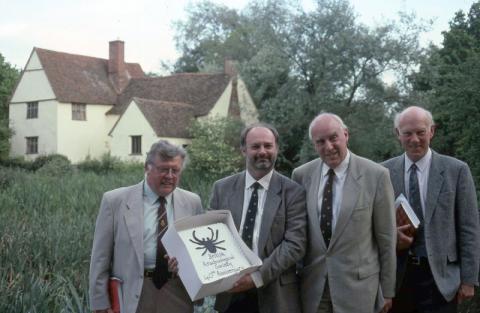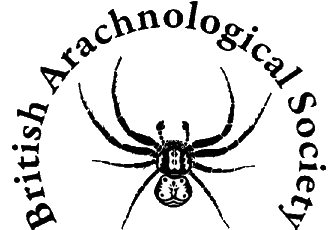What we do
The BAS is Britain’s only charity dedicated exclusively to spiders and their relatives – the arachnids. We use science and education to advance the wider understanding and appreciation of arachnids and to promote their conservation. Our main focus is Britain’s over 680 species of spiders, 34 harvestmen and 27 false scorpions (pseudoscorpions). We are very actively involved in providing accurate information to the public on these very important, fascinating, but often misrepresented animals.
The BAS is an inclusive organisation and encourages active participation in the study of arachnids - arachnology - through the provision of information, training and mentoring to anyone wanting to become more involved in identification, recording or studying the biology of this group. Support and information are also provided via our website and, increasingly, through social media, including Instagram, X, BlueSky and YouTube.
Much of the information and advice we provide is freely available to everyone, although our members additionally benefit from access to our tri-annual Newsletter, our journal Arachnology and more specialised content on our YouTube channel. In joining a growing community of arachnologists, they can share queries, advice and observations via our discussion forum and use our very extensive library of arachnological literature.
Children are also encouraged to develop their enthusiasm for arachnids through events and 'Cobweb Corner' on our website which hosts regular articles contributed to the Amateur Entomological Society's Bug Club magazine.
The BAS runs the national recording schemes for spiders and harvestmen and supports the scheme for false scorpions. These provide up-to-date information on the distributions of arachnid species and also contribute to our knowledge of their biology and habitat requirements.
Our recording schemes, together with targeted surveys and research, help to underpin arachnid conservation in Britain. We provide impartial scientific information and expert advice to Government and the non-governmental conservation organisations as well as to conservation practitioners, private interests and the public.
Although the main focus of our work is in Britain, we are part of a much wider community of arachnologists worldwide. We have a significant overseas membership our journal Arachnology has an international remit.
Our history

The BAS has its origins in the Flatford Mill Spider Group, initiated in 1958 by a small band of enthusiasts lead by David Mackie; it effectively began with the first issue of the group’s journal, the Bulletin, in January 1959. By 1963 the expanding group was renamed the British Spider Study Group and at its tenth annual meeting, in 1968, it resolved to register as a charity and become the British Arachnological Society. This became a reality in 1969. In 2019 the Society changed its charitable status to become a Charitable Incorporated Organisation. Articles by Peter Merrett in our 2009 Newsletters (issues 114 and 115) provide additional information on the history of the BAS.
The BAS today
The Society is currently administered by a Council comprising four statutory officers (President, Vice President, Hon. Treasurer and Hon. Secretary) and up to 14 additional trustees, all of whom are elected from, and by, the BAS membership at an Annual General Meeting. Council is chaired by the President and is responsible for the overall governance and strategic direction of the BAS, developing the organisation’s aims, objectives and goals in accordance with its constitution and rules. All trustees are elected for a three-year period; Council meets four times a year.
The BAS has around 650 members, about 18% of them from overseas. It is a wholly voluntary organisation without paid staff or dedicated premises. Our volunteers play a number of key roles, including organising regional events (Regional Coordinators), ensuring the validity of new arachnid records (Area Organisers) and supporting new members as they gain experience in arachnology (Mentors). Our work depends entirely on the generosity of donors and grant-givers, and on our members and active volunteers.
